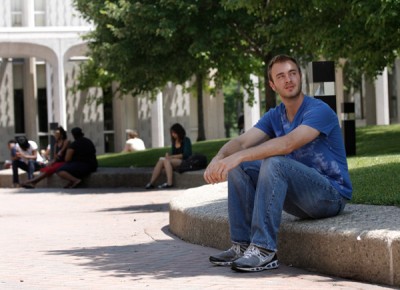Charlie Nelms, former chancellor of North Carolina Central University, wants to send higher education faculty members back to school. Speaking at a panel during the Democratic National Convention in Charlotte, Nelms stressed the need for college and university professors to “teach people, not content.”

Jake Boyd, photographed on the campus of Macomb Community College in Warren, MI. Boyd took five years to finish a criminal-justice degree while working two jobs at the same time he was going to classes. (ROB WIDDIS/Special to MCT)
Nelms believes that faculty members who went through postsecondary education years or even decades ago are not equipped to teach today’s students. He and his fellow panelists also mentioned the need to retool work study programs so they become more relevant to students. Other suggestions included improving the use of technology in higher education and pushing remediation into high school – all to help more Americans get a degree.
The ideas were vetted during The College Advantage, a panel focusing on ways to improve higher education attainment for students, which happens to be President Barack Obama’s signature American Graduation Initiative.
Obama has called for 60 percent of Americans aged 25-34 to have a postsecondary degree of some kind by 2025. The Lumina Foundation, which hosted the panel, shares those goals, which so far appear to be falling short. (Disclosure: The Lumina Foundation is among The Hechinger Report’s many funders.)
For decades, those with only a high school diploma had ample opportunity to be a part of the middle class, explained Anthony Carnevale, director of the Georgetown University Center on Education and the Workforce. That opportunity started decreasing in the 80s, he said, and accelerated during the recent recession.
By far the most jobs lost in recent years were those requiring only a high school degree and no education requirements, according to recent research by Carnevale’s group. And unlike jobs requiring some college or a bachelor’s degree – which Carnevale said are growing again – jobs for those with only a high school degree continue to fall.
“They’re gone and not coming back,” Carnevale said. “To the extent that we keep looking for those jobs, we’re looking in the rearview mirror.”
And while college enrollment is up, it’s not going to stay that way, Carnevale said. “During the recession a lot of people ran into college,” he said. “It was a good place to hide.”
Enrollments are now dropping, with more schools having space available than at any time in at least a decade.
Panelists were clear that the main problem is not access to higher education but degree attainment, particularly for minority males.
Nelms thinks the issue should be tackled by black and Latino groups and leaders.
“If we wait for the white power structure… to initiate that conversation, it’s not going to happen,” he said.
Aaron Smith, executive director of Young Invincibles, a group that represents the voices of 18-34 year-olds in policy discussions, was also concerned about student loans policies and the possibility they may dissuade people from going to college. And Smith also wants to see more opportunities for education and the workforce to connect. He advocates sending college students to local companies and asking them for work study or internship opportunities.
American Chamber of Commerce Executive President Mick Fleming said the business community “has been slow to the table on higher education,” while very involved in the K-12 years.
“Everybody in the business community is saying what do we fix? The ‘what’ becomes the next step.”
Fleming had an answer. “[We need to] start to say this is what we need, and actually express it,” Fleming said.



